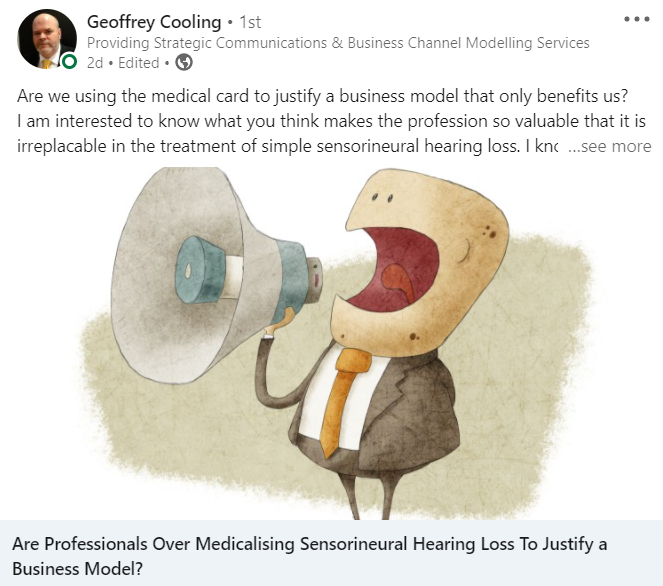
Treating Excessive Ear Wax in a COVID-19 Environment
March 4, 2021
A Response to Geoffrey Cooling’s Recent Linkedin Post entitled “Are Professionals Over Medicalising Sensorneural Hearing Loss To Justify a Business Model”
July 16, 2021Yesterday, Good Morning America (ABC) aired a story about a recent announcement from the Biden administration regarding hearing aids. According to the story, the Biden administration has issued an executive order directed to the Department of Health and Human Services to do two things. First, to issue plans to “combat price gouging” regarding hearing aid costs within 45 days and second, to take action within 120 days to propose getting hearing aids available over the counter.
Let’s unpack this story a bit further to help both consumers and hearing health professionals understand it effectively.
First, The Over-The-Counter Issue
This executive order is being issued even though the FDA (who was mandated by federal law in August of 2017 to establish a regulatory category for the manufacture of over-the-counter (OTC) hearing aids) has yet to propose or issue such manufacturing regulations, and likely won’t do so until sometime in 2022. Since these regulations are intended to insure consumer safety when purchasing a hearing device over the counter, it seems at best an oversight for this not be be mentioned as part of the GMA story. Interestingly, the FDA mandate specifies that OTC hearing aids are to be designed to accommodate people with “perceived mild-to-moderate hearing loss”. The reported target for Biden’s initiative as stated in the GMA story are people with “serious hearing loss”. Such terms are not only contrasting, but ambiguous and subject to wide and varied interpretation, suggesting a lack of thoroughness in the research behind this executive order.
Certainly, the Department of Health and Human Services is or should be aware of this FDA mandate and its associated importance in protecting the consumer. As such, until such regulatory requirements are established, making hearing aids available to consumers over-the-counter will remain unregulated and in some state law interpretations, illegal.
That said, hearing aids or products claiming to be just like hearing aids have been available direct-to-consumer for some time through the internet. In fact, these products have been available for purchase by consumers over the internet since well before August of 2017. Unless the manufacturer of these products have registered them as hearing aid medical devices with the FDA, the products sold on the internet are also unregulated.
Traditionally, consumer safety regarding hearing aid use has been enforced through state licensing laws governing hearing health providers. These licensing laws are designed to insure that the provider has the necessary education and takes the necessary steps to insure that any FDA registered hearing device being fit to a consumer is configured to operate both effectively and safely for that consumer. Thus, when the professional care channel is bypassed, the licensing laws established to insure consumer safety are bypassed as well. That is why the upcoming FDA regulation is important. And that is also why the 120 day mandate in Biden’s executive order appears uninformed as well.
Second, The Cost Issue
There is no question that acquiring hearing aids can be expensive. Both consumers and hearing health providers can readily agree on that. But the key here is “can be” not must be.
Let’s look at some facts.
First, there is no hearing aid benefit offered by Medicare. The costs of hearing related products and many hearing related services are currently not covered by Medicare. So, the bulk if not all of the cost must be born by the consumer. Even with Medicare Advantage insurance programs that offer some form of a hearing benefit, there is still in many cases a high cost passed on to the consumer. And for those younger individuals who do not yet qualify for Medicare, there is little coverage assistance available. In a consumer survey conducted in 2019 of over 20,000 consumers, for individuals who need hearing help but have not sought it, the number one motivator to take action was identified as “having insurance cover some/most of the cost.”
Second, to insinuate that high cost is evidence of price gouging is disingenuous. Gouging is an inflammatory word. And, without subsequent evidence, can be used as a broad brush to paint the innocent as well as any who may be guilty. Certainly, there may be instances where a hearing health provider demonstrates such reprehensible behavior. But, those instances are rare, and state licensing laws do a pretty good job in identifying such cases and protecting consumers from them. At the provider level, price gouging is neither an epidemic nor a valid reason to point to when discussing cost. Perhaps the Biden administration is talking about gouging at the manufacturer level. Although this is not clear in the GMA story, other reporting from yesterday may suggest this may be the case.
Third, consumer electronics companies are chomping at the bit to get into the hearing aid market and they have clearly decided that it is in their best interests to point the “gouging” finger at the “middle-man”. It is their primary argument to convince consumers and others that to really lower hearing aid costs, consumers should bypass professional care. This argument flies in the face of consumer opinion. Nowhere in the above cited consumer survey did consumers indicate or express a desire to bypass professional care in order to address out-of-pocket costs. There are two things related to the consumer electronics argument that are worth noting. First, most consumers would be shocked to learn that for many of the high-end hearing aid technologies being demanded by consumers today, the hearing health provider is paying the manufacturer thousands of dollars to purchase those aids wholesale. The professional services margin on many of today’s high-end hearing care/product purchases is much thinner than the consumer electronics manufacturers would like consumers to believe. Second, there are a number of high-quality, FDA registered hearing aid product options that can be purchased through professional channels that offer effective and beneficial solutions to hearing issues without costing thousands of dollars. These options can make purchasing devices through professional channels very affordable. But this fact is overlooked by consumer electronics companies, unrecognized by legislators, and is simply not a sexy enough story line for journalists looking for more sensational headlines.
Finally, what continues to get lost in all of the confusion being generated by lawmakers and disrupters who overlook key facts as they seek headlines or profits , is that hearing care is fundamentally HEALTH care. It is a health issue first. And, it is a health issue BEFORE it is a commodity purchasing issue. This should be overwhelmingly obvious to anyone who is aware of and acknowledges the many significant comorbidities associated with hearing loss. Comorbidities like dementia, cognitive impairment, depression, cardiovascular disease, diabetes, fall risk and more.
Effective hearing loss treatment includes a clear understanding of the issues at hand, an effective diagnosis of the circumstances that created those issues, a carefully crafted treatment strategy that may well include devices which will then be programmed to best accommodate the issues at hand, and the subsequent therapeutic guidance essential to most effectively use and benefit from the treatment provided. Ninety-five percent of consumers who receive professional hearing care are very satisfied with that care and the treatment provided. This is not speculation. These are facts. Facts that get buried under the posturing of others who see opportunity, and are willing to skip over inconvenient truths, or foment misinformation to support their agenda rather than taking the time to clearly research and understand what consumers really want — affordable, professional hearing HEALTH care.
Picture property of Reuters
Author: David Smriga, VP Corporate Communications, AUDNET Hearing Group




1 Comment
Thank you for writing this! I cringed when I heard about the executive order. Although I respect the President, this is a misstep. Give the FDA time to handle COVID and then they can sort out some of this. Plus, the Medicare for All folks want hearing aids coverage included.. I don’t price gouge, unbundle my services from the product, and strive to provide best practices. for patient care. I’m tired of being wrongly accused. when I’m just trying to keep my doors open so I can help people.. This IS a healthcare issue. I have no problem with mild (not moderate) powered “reading glasses for the ears” but the general public has little to no experience with audiologists compared to optometrists. They don’t understand the difference between simple amplifiers and the varied levels and price points of hearing aid technology. Hearing aids, with all their microchips, programming possibilities, and acoustic variables are tremendously more complicated than eyeglasses, but they aren’t all outgrageously priced.. Uninformed opinions can be harmful.